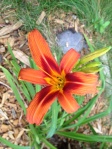 In this part of the world, it might finally be safe to get our gardens growing. The winter of 2014 brought a record amount of snow, and I’m glad it’s all gone. The last frost has passed, the grass is growing, and flowers can go in the flower beds. Vegetable gardens can be planted and I can start looking forward to fresh tomatoes that actually taste like a tomato.
In this part of the world, it might finally be safe to get our gardens growing. The winter of 2014 brought a record amount of snow, and I’m glad it’s all gone. The last frost has passed, the grass is growing, and flowers can go in the flower beds. Vegetable gardens can be planted and I can start looking forward to fresh tomatoes that actually taste like a tomato.
I will get back to the garden theme in a few minutes. Leonard Bernstein was one of the most talented and versatile musicians that America ever produced. He was a fine pianist, one of the world’s greatest conductors, and a top rate composer. One of his most often performed pieces for orchestra is the Overture to Candide. Candide is a novella by the philosopher Voltaire that was published in 1759. It is a satire with a sarcastic tone, and one of the most influential writings from the “Age of Enlightenment”. You can read the whole book in translation online here.
Candide, a novella by Voltaire
Bernstein wrote the music for an operetta Candide based on Voltaire’s novella. It was first performed in 1956, but was revised by Lenny over the years with a “Final Revised Version” appearing in 1989. If you have two and a half hours on your hands, you can watch a concert performance of the complete operetta with Leonard Bernstein conducting here.
Candide, operetta with music by Bernstein
The Overture to Candide has entered the repertoire of the symphony orchestra and is frequently performed. It is a true overture to a theater work, where you are introduced to some of the melodies from the operetta. In a simplistic sense, this kind overture is like a greatest hits medley played before the show. Melodies from songs such as “Glitter and Be Gay”, “The Best of All Possible Worlds” and “Oh, Happy We” are included in the overture.

Bernstein was music director for the New York Philharmonic for many years, and they have a special tradition when they play the Overture to Candide. After he died in 1990, the New York Philharmonic played the work at a memorial concert without a conductor. It’s a powerful tribute that they repeat to this day, always performing this piece with an empty conductor’s podium. This is no small musical feat, considering the changing tempos and meters contained in the Overture.
Here is a performance with Bernstein conducting in 1989.
One of the most moving parts of the operetta is actually the finale entitled “Make Our Garden Grow”. (See I told you I would come back around to the gardening thing.) It would obviously be a difficult aesthetic feat to have included the finale music of a work in the beginning overture, so this is not one of the tunes Lenny included in the Overture to Candide. There are many trite references I could make to the music in this number “growing” and “blossoming” as it builds to the big finish, but I want to think I’m better than that. I’m probably not, but I want to think so.
Here is a great performance of the closing of Candide.
Happy Gardening!


A wonderful article about a true American treasure,a musical triple threat.I always love the “Seinfeld” episode “The Maestro” where the fella insists on being called Maestro because he heard someone ask Lenny “hey Maestro how bout a beer?” So he figures all conductors should be called Maestro…even if they are just the conductor of the Policeman’s Benevolent Orchestra!!